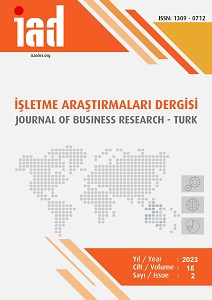Materyalist Tüketim veya Azaltılmış Tüketim: Bilinçli Farkındalık Bakış Açısıyla Bir Değerlendirme
Materialist Consumption or Reduced Consumption: An Evaluation from Mindfulness Perspective
Author(s): Sevde Yüksel, Arzu ŞenerSubject(s): Business Economy / Management, Behaviorism, Human Resources in Economy
Published by: Orhan Sağçolak
Keywords: Mindfulness; Materialism; Downshift/reduced consumption; Sustainable consumption;
Summary/Abstract: Purpose – This study has been designed to determine the relationship between conscious awareness in consumption, which is presented as a consumer attribute that mitigates the negative effects of overconsumption, and materialism, which is an approach focused on consumption and material values with reduced consumption behavior. Design/methodology/approach – A relational survey research model was employed in this study. The study encompasses individuals aged 18 and above residing in Turkey. The sample of this study consists of a total of 528 participants gathered from different regions of the country. Data was collected through an online survey using the snowball sampling method between November 15, 2021, and December 30, 2021. The survey was implemented using the free Google Forms software. Findings – It has been determined that there is a statistically significant relationship between mindfulness and reduced consumption behavior in the positive direction, between mindfulness and materialism tendency in the negative direction, and between reduced consumption behavior and materialism tendency in the negative direction. Discussion – In order to deal with overconsumption and materialism, this study based on two sustainable consumption styles which are reduced consumption and mindfulness. In addition, the relationship between mindfulness and reduced consumption is examined, and a psychological approach is presented in terms of awareness to develop sustainable consumption behaviors. This has also been introduced to reduce unsustainable consumption patterns. The results obtained are similar to the results that has been found in other studies in the literature.
Journal: İşletme Araştırmaları Dergisi
- Issue Year: 15/2023
- Issue No: 2
- Page Range: 1178-1195
- Page Count: 18
- Language: Turkish

